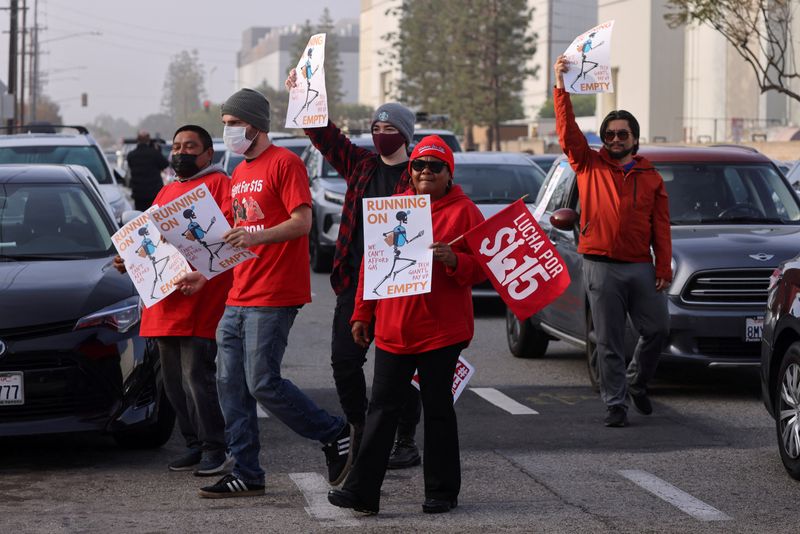By Nandita Bose
WASHINGTON (Reuters) - After weeks of lobbying the White House on how gig workers should be treated, the rideshare, delivery and retail industries are bracing for a new rule that is likely to make it easier to classify them as employees, multiple sources say. A proposed rule from the Department of Labor, aimed at defining whether gig workers for companies including Uber (NYSE:UBER), Lyft (NASDAQ:LYFT), DoorDash and retailers such as Amazon.com Inc (NASDAQ:AMZN) are misidentified as independent contractors, is under review at the White House's Office of Information and Regulatory Affairs (OIRA) and is expected to be released in coming weeks.
While the details of the new rule are not known, the department could model it on legal guidance that says people economically dependent on a company are employees, or go even further to expand the pool of workers who should receive benefits, legal experts said.
Groups representing employers, including the U.S. Chamber of Commerce, The National Association of Home Builders, The National Retail Federation and the Associated Builders and Contractors have met with officials at the White House's Office of Management and Budget, according to White House records and sources.
Some of the groups have been trying, and failing, to convince the White House that any broad rule would hurt workers who want to remain independent and have flexibility, people familiar with the discussion said. More than one-third of U.S. workers, or nearly 60 million people, performed some sort of freelance work in the past 12 months, a December 2021 survey by freelancing marketplace Upwork (NASDAQ:UPWK) showed.
Broadly defining independent contractors as employees would also force companies to pay benefits, such as overtime pay and health benefits, that would hurt their bottom line. Employers can save about 30 percent by skipping payroll taxes and unemployment and benefit costs, workers' groups estimate.
The meetings at the White House were one-sided, with officials at OIRA letting groups speak and not participating or asking follow-up questions, several employer sources said. They are interpreting that as a sign the Biden administration's mind is made up.
POLITICAL
"It's all very political. The administration has been clear about the stakeholders they care about and how organized labor is something they care about," said a senior official at one of the employer groups, who met with the White House to discuss the proposed rulemaking.
"We expect it to be more antagonistic toward independent work," the official, who did not wish to be named said, and to hurt companies that rely on gig labor.
A White House official said that listening without comment is part of the standard rulemaking process at OIRA.
Representatives and lobbyists for employers argued against "administrator interpretation" and "the economic realities test" issued in 2015 under the Obama administration, which said most workers should be considered employees under the Fair Labor Standards Act. They also presented their opposition to the "ABC test" which determines employee status.
"I'm not optimistic that the concerns we raised is going to change the direction of the rulemaking," said another lobbyist for an employer group, who spoke to the White House.
The White House and the Department of Labor declined comment. Amazon did not respond to a request for comment. A spokeswomen for the Flex (NASDAQ:FLEX) Association, which represents Uber, Lyft, DoorDash, said any drastic change that will limit workers' flexibility "could have dire economic consequences as well as reduce income and limit options for workers."
WORKERS WARN OF GROWING PAIN
Gig Workers Rising, RideShare Workers United, Mobile Workers Alliance, We Drive Progress also met White House officials to broaden the definition of employee further, according to records and sources.
A growing number of companies, including in health care, are misclassifying hundreds of thousands of workers across the United States, they argued. Workers in industries that rely on contractors, like food delivery services, say they're left without social safety nets, accident coverage or paid sick leave, and squeezed by high gas prices.
"This is a model in which if we don't draw a line in this country, every job is at risk ... and so this rulemaking should be about ensuring people have basic protections," said Nicole Moore, a part-time Lyft driver and the president of the group Rideshare Drivers United.
Moore said the rulemaking would help Democrats if it were to be released before the November midterm elections that will determine whether Republicans or Democrats control Congress.
"The last thing Americans want is to hear promises on what the party stands for, what it will mean to have folks in the White House, Senate and House of Representatives and then to have nothing happen," she said.

"Leaving out misclassified workers would be a huge mistake."
This is President Joe Biden's second stab at re-setting rules about how employees can be defined, and is expected to be quickly challenged in court by companies.